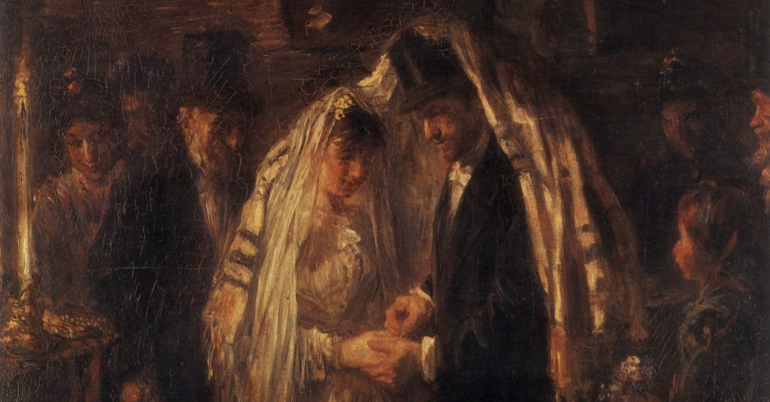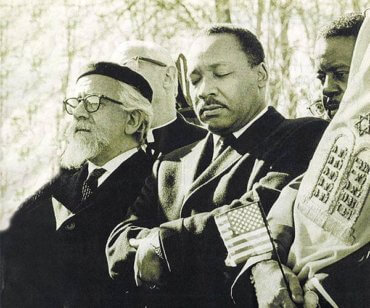
Do Men Take Ownership Of Their Wives During Jewish Weddings?
Dear Jew in the City-
What’s with the business of a man being “koneh” a woman and the way the girl’s father gives ownership to the husband with the kerchief at the wedding?
Thank you,
Z.C.
Dear Z.C.-
The first thing to know is that words don’t mean the same thing in all times, places and cultures. “Nice” used to mean silly or foolish; “naughty” used to mean evil or immoral; “awful” used to mean deserving of awe. A British girl I know was once appalled when she heard that Orthodox women don’t wear pants. This was because what we call “pants,” they call “trousers.” To her, “pants” meant underwear! So when you hear that a man “acquires” a woman, you think like a piece of property but such is not the case. That’s like assuming that to deliver a baby requires the input of FedEx or UPS. Words can mean different things.
Clearly “to acquire as a wife” is not the same as “to acquire property.” I can sell my property, or give it away. I can’t do that with my wife. Compare the laws of a husband and wife with those of a master and servant – they’re completely different.
Now, a perfectly fair question is why the man “acquires” the woman as a wife but she doesn’t “acquire” him as a husband in return. The answer is “polygamy.” A woman is only allowed one husband so she is “acquired” by her husband but a man – at least under Biblical law – is permitted more than one wife, so he’s not “acquired” by her.
The reason polygamy is permitted but polyandry (more than one husband) isn’t is simple. Polygamy was permitted to avoid shidduch crises. If Israel went to war and 400,000 men were killed, there would be a terrible shortage of eligible bachelors. Allowing polygamy prevented that. Polyandry is prohibited because we need to know who a baby’s father is. If women had multiple husbands, it would mess up many important mitzvos, from inheritance law to not marrying your sister. Prohibiting polyandry prevents that. (It should be noted that polygamy was always discouraged and is no longer practiced, so this matter has little practical impact for anyone reading this.)
I think you’re confused about the handkerchief. That’s called a kinyan sudar and it has nothing to do with “giving the bride away.” It’s actually part of executing a contract. (You make a kinyan sudar when you empower your rabbi to sell your chometz for you.) When the groom accepts the conditions of the kesubah (which protects the bride’s rights!), he takes a handkerchief from the rabbi as a sign of his consent.
Another kinyan sudar potentially takes place at the tna’im. This is where the two families agree to their respective responsibilities for the wedding. This used to be performed a year before the wedding but nowadays it’s usually performed during the “shmorg” and is pretty much symbolic. (Nobody ever called off a wedding in progress because they couldn’t reach an agreement – by that point, everything was already done!) The parties accepting the handkerchief at this point have even less to do with effecting marriage than the choson accepting it at the kesubah!
Sincerely,
Rabbi Jack Abramowitz
Educational Correspondent
Follow Ask Rabbi Jack on YouTube
If you found this content meaningful and want to help further our mission through our Keter, Makom, and Tikun branches, please consider becoming a Change Maker today.








1 comment
Sort by
In the animal kingdom, polygyny (one male with multiple females) is fairly common while polyandry (one female, multiple males) is virtually non-existent. There’s a very simple biological explanation. From an evolutionary perspective, your most important function is to reproduce and rear successful offspring who will themselves reproduce. For this purpose you will devote all your resources and even, in certain circumstances, your life. Therefore, it absolutely critical that you know who your offspring are. The biggest possible mistake you could make from an evolutionary perspective would be to lavish your resources on someone ELSE’s offspring which would be like scoring an own-goal in soccer. Not only have you failed to score for yourself, but you’ve scored for the opponents. In polygyny, the father knows who his offspring are (namely, the offspring of “his” females) and the females know who their offspring are (the ones they gave birth to). In polyandry, no one knows who the father is, therefore the father has virtually no interest in caring for them or provisioning them. (There are a few rare cases where a group of brothers share females, because they’re going to be closely related to the offspring no matter who fathered them). In animal and human societies in which one male can acquire enough resources to provision multiple females and their offspring, and the females don’t need the full-time assistance of the male in child rearing, you’re going to see polygyny (eg horses, seals, lions, and others with “harems”). Where the successful rearing of young requires the full-time assistance of the male (most birds) you’re going to see monogamy. Humans are somewhere in between, depending on the society and, of course, the sex ratio, which is influenced by the factors you mentioned — chiefly warfare reducing the male population.